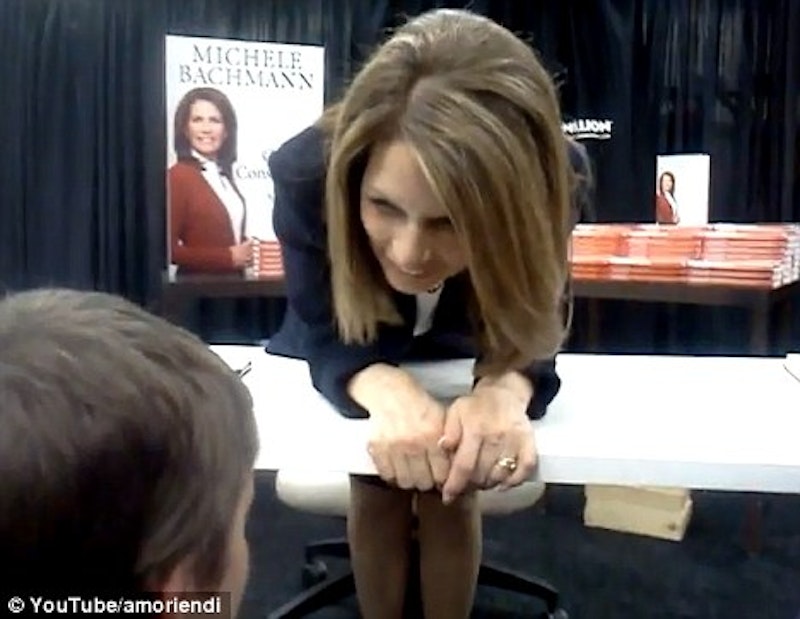Earlier this week a video titled "Activist Elijah with Michele Bachmann" went viral on YouTube. The video shows Michele Bachmann meeting and greeting. A woman comes up with her son, and asks the boy if he has something he wants to say. The boy whispers, Bachmann doesn't hear, so his mom encourages him to say it again. Bachmann leans closer and the boy says, still softly, but audibly this time: "My mommy's gay, and she doesn't need fixing." After which, Bachmann says, uncomfortably, "Bye bye."
The video has generated a lot of comment on the left, most of it negative. The general consensus is that using kids as political props is wrong. Dan Savage, speaking as a gay parent, sums up the general zeitgeist:
Even if that eight-year-old kid wanted to do it, even if confronting Michele Bachmann was the kid's idea, even if the kid was excited about being in a YouTube video... this just isn't cool [….]
We shouldn't use our kids like this. Even if one of our kids wants to be used like this—even if our kid is a precocious little eight-year-old asskicker who want nothing more than to get all up in Michele Bachmann's crazy face (and that's not how this kid comes across)—we need to exercise sound parental judgment and tell our kids, "No, honey, not now. Maybe later."
"Maybe later" is, of course, something we tell our kids all the time. And there are differences between adults and kids obviously, in terms of knowledge and impulse control and relative level of socialization. There are some things kids do have to wait for. When my eight-year-old jumped into the car's drivers' seat the other day, while the engine was running, and started to mime driving, I told him in no uncertain terms that he needed to never, ever do that again (at least until he's 16.) When he wears clashing stripes, I tell him he's got to change. At some point he can make idiotic sartorial choices to his heart's content… but not yet.
But the thing that you discover about eight-year-olds is that, for all the ways in which they differ from adults, they're still remarkably like people. They know what's right even if (like most of us) they don't always share or treat their friends well. And, just as they understand moral issues, they can understand political issues clearly enough. Just the other day I ended up more or less accidentally in a discussion with my son about nuclear war, and after I'd explained it, he said, "Why did they make bombs that would destroy the world? That's stupid!" Which, you know, seems like a very reasonable reaction to have.
If, then, kids can have moral opinions, and if they can have political opinions, and if those moral and political opinions are in no discernible way stupider or really even less informed than the moral and political opinions of most really-quite-shockingly-uninformed adults, it's not clear to me why they shouldn't be allowed to express those opinions in public, to the extent that they're able. Elijah lives in this country; if Bachmann's president, she'll be his president too. If he really wanted to tell her what he thought (as it appears he did) why shouldn't he be allowed to do so?
I know what damage it would potentially do to allow my son to drive my car. But what damage are we worried about for Elijah? Comments threads can be pretty awful, admittedly… but the mom seems to have disabled comments. And surely, if there may be a downside, there's also some benefit; participating in civic life and learning that your leaders are responsible to you both seem like positive things.
And what Elijah said was worthwhile. Gay people have families, and when Bachmann and those like her attack gays and lesbians, they're attacking, among other people, children, both gay and straight. Elijah told her so. Good for him.

